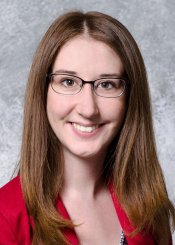Story written by: Matthew Schmidt
Editor’s note: Jennifer Ball, an assistant professor of pharmacy practice and practicing pharmacist at Center for Family Medicine in Sioux Falls, was named the college’s outstanding scholar in 2020.

At the Center for Family Medicine, we had started a medication-for-opioid-use-disorder team clinic one-half day each month to serve patients driving up to six hours to get into our clinic as one of the only practices in South Dakota. Soon afterward, the state had received grant funds to expand medication-for-opioid-use-disorder training.
Since we had been using our clinic to train pharmacy students and family medicine residents, it seemed like a no-brainer to apply. Thankfully, the South Dakota Department of Social Services agreed.
In September 2018, the state awarded SDSU $181,916 to further develop a one-half day a week training clinic and addictions medicine rotation for medical residents related to the practice of primary care addiction. This contract has been renewed multiple times through May 2022 for a total of more than $1 million in contracts to continue and expand the work.
Since starting, we have had approximately 15 pharmacy students and 10 medical residents rotate through the addiction clinic each year.
Opioid addiction care in South Dakota
Treatment for opioid-use disorder is an evidence-based practice using medications, such as buprenorphine, with or without counseling. Buprenorphine is a life-saving medication that can be prescribed by Drug Addiction Treatment Act, waivered prescribers long term experience reduced cravings, physical and emotional stability and improved patient lives.
It has been shown to reduce overdose mortality, decrease infectious complications such as HIV and Hepatitis C, reduce criminal activity and improved social functioning.
The addiction clinic is an interdisciplinary environment with a lead physician, therapist, pharmacist and nurse case manager in addition to P4 pharmacy students, medical residents and even nursing students and practicing professionals.
The team meets the patient, develops a plan and provides education. Six to 10 patients are seen in these half days with time between patients for teaching. Since 2018, the Center for Family Medicine has treated more than 300 patients with opioid-use disorder with treatment retention averaging 13.5 months and 89% staying engaged in care by the end of year two.
Grant funds program to improve prenatal care
The Pierre Family Medicine Residency Program started in 2018. Medical residents practice out of Center for Family Medicine in Sioux Falls for the first year with years two and three in Pierre.
Since the start of the program, Sanford Clinic Pierre began offering prenatal care.
This became a great time to reevaluate how both Sioux Falls and Pierre wanted to provide optimal prenatal and postnatal care. In working on ideas, the Department of Social Services Innovation in Primary and Prenatal Care Grant became available, and the Center for Family Medicine received one of the three $333,000 grants to study plans to reduce maternal morbidity and mortality.
The prenatal project decided on was a six-part program focused on improving care, patient education, screening and provider education and support.
- Contact:
- Telephone number: 605-688-6161
Republishing
You may republish SDSU News Center articles for free, online or in print. Questions? Contact us at sdsu.news@sdstate.edu or 605-688-6161.

